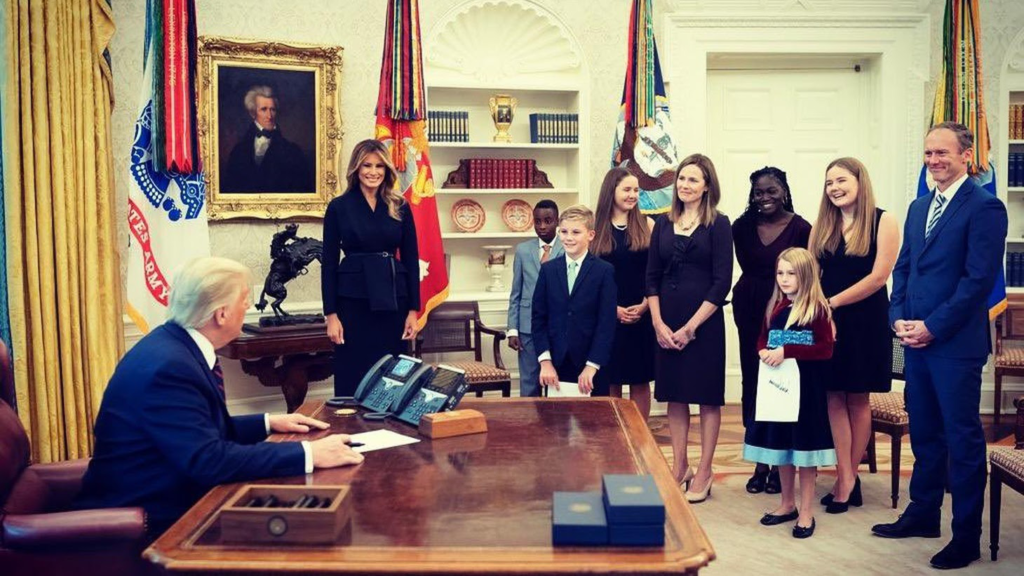President John Garvey’s Washington Post Op-Ed

Courtesy of Office of the United States First Lady
By Javi Mazariegos
On Saturday morning, the Washington Post published an opinion piece by Catholic University President John Garvey on President Trump’s recent Supreme Court nominee, Amy Coney Barrett, who was nominated earlier that day. President Garvey’s article was titled “I taught and worked with Amy Coney Barrett. Here’s what people get wrong about her faith.” Anyone familiar with Garvey’s writing style would find it no surprise that this article was written in his clear, short style; every word was put to use in his praise of the recent nominee.
President Garvey opens his article with a short story showcasing Barrett’s brilliance as a law school student. President Garvey was a professor at Notre Dame’s Law School from 1994-1999 before becoming the Dean of Boston College Law School. Barrett graduated first in her class at Notre Dame Law School in 1997.
Immediately after she graduated from Notre Dame, Garvey hired Barrett as a research assistant and co-wrote an article with her explaining how Catholic judges ought to refrain from applying the law in cases where the law opposes moral conscience. From this mention, Garvey pivoted to the main point of his article: Barrett’s faith is anything but an impediment to her serving as an excellent justice on the Supreme Court.
President Garvey mentioned that many of Barrett’s opponents accuse her of being unfit for an appointment to the federal courts because of her religious beliefs. She is often negatively presented for belonging to the People of Praise, an ecumenical Christian organization started in South Bend in the 1970s.
President Garvey not only defended Barrett’s association with the People of Praise, but wholeheartedly praised the entire movement, citing that Pope Francis referred to the group among “a current of grace in the Church and for the Church.” Garvey pointed to the fantastic schools around the country as an element of the People of Praise has done for the church and for the nation.
While he holds the way Barrett, the mother of seven children, lives her faith in a positive way, President Garvey is not deaf to the critiques lobbied against the People of Praise. He gets right to the point in highlighting that Barrett is often portrayed as giving into “submissive gender roles.” Garvey brushed this off as untrue with a quick mention of the nature of Barrett’s marriage to Jessie Barrett, who was also an outstanding man and lawyer.
“Her husband — I taught him, too — is a wonderful man and a remarkably able lawyer, as was Ginsburg’s husband,” wrote Garvey. “No one who knew either couple would suppose that the woman needed instruction on how to think.”
Yet, a major touchpoint for President Garvey in dispelling the myths around Barrett was another gesture to her legal and academic brilliance. President Garvey mentioned that he was the law professor who wrote a one-sentence recommendation for her clerkship with the late Justice Scalia.
This famous one-sentence recommendation was used by President Trump in his announcement of Barrett’s nomination. Garvey wrote, “After she graduated from law school, I wrote a one-line letter of recommendation for her to Justice Antonin Scalia: ‘Amy Coney is the best student I ever had.’ He was wise to hire her as a clerk.”
In addition to her brilliance, Garvey used this opportunity to speak broadly against the kind of critique that Barrett received in her initial confirmation hearings for the federal circuit. Garvey writes that “fidelity to traditional Christian teachings rub some lawmakers the wrong way.” Whether this fidelity is applied to the People of Praise or to Barrett herself, it is used as a point against Barrett.
Garvey pointed out that an aversion to religious adherence is not new in the English common law system, pointing to the English Test Act and Corporation Act which barred Catholics faithful to traditional Christian teaching from holding public office.
While this may be a historical phenomenon, Garvey pointed to one large body of law that defends Barrett: the Constitution. In addition to the First Amendment protection of religious freedom, the only other mention of religion in the Constitution is “no religious Test shall ever be required as a Qualification to any Office or public Trust under the United States.”
“[The Constitution] has, for more than two centuries, been a guarantee of a tolerant pluralism in our country,” Garvey argued. “The Constitution invites Catholics, evangelicals, Mormons, Jews, Muslims and nonbelievers alike to serve their country, and promises them that they won’t be interrogated about the way they choose to love and serve God.”
His last gesture was to mention that in his position as the president of the Catholic University of America he is “invested in Catholics’ continued service to America” and accordingly opines that Barrett’s fidelity to Christian teachings not be something that in any way disqualifies her from serving the constitution and country she loves.





